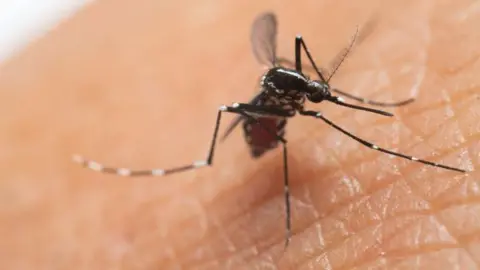The United Kingdom is witnessing a troubling increase in cases of chikungunya, a mosquito-borne virus typically endemic to regions such as Africa and Southern Asia. Recent reports from the UK Health Security Agency (UKHSA) indicate that over seventy cases of this virus were documented in the initial six months of 2025. This figure represents more than a twofold increase compared to the same period in the previous year, where only twenty-seven cases were recorded. All reported infections this year have been linked to travel, highlighting the virus’s association with international trips to affected regions.
Chikungunya virus, while rarely resulting in fatalities, can lead to debilitating symptoms, primarily characterized by severe joint pain and sudden fever. Often, affected individuals may experience prolonged joint pain that can last for months or even years, significantly impacting their quality of life. This increase in cases has prompted health authorities to issue warnings and advisories, especially directed towards travelers heading to regions where the virus is prevalent.
Dr. Philip Veal, a consultant in public health at the UKHSA, has emphasized the importance of taking precautions against mosquito bites and has outlined simple preventive measures. These recommendations include using insect repellent, wearing protective clothing to cover the skin, and sleeping under insecticide-treated bed nets. Such measures can substantially lower the risk of contracting chikungunya and enhance travelers’ safety during their explorations in susceptible areas.
Currently, chikungunya is transmitted primarily by two species of mosquitoes: Aedes aegypti and Aedes albopictus. Fortunately for the UK population, neither of these species is present within the country. Thus, despite the rising number of cases among those returning from travel, there remains no risk of local transmission within the UK. However, the alert raised by the UKHSA serves as a crucial reminder for travelers about the importance of being proactive in safeguarding their health during trips abroad. They are encouraged to consult the Travel Health Pro Website for up-to-date advice regarding their destinations. For individuals traveling to higher-risk areas, considering a chikungunya vaccine may also be prudent.
In a broader context, the report from UKHSA not only highlights the surge in chikungunya cases but also notes the emergence of Oropouche virus cases in the UK, which have been traced back to travelers returning from Brazil. Typically, Oropouche virus is spread via midge bites, with the main midge species responsible for transmission absent from Europe and the UK. Symptoms of Oropouche infection encompass high fever, chills, joint pain, and muscle aches. The resurgence of this virus globally since 2024 raises additional concern, particularly for pregnant travelers due to potential risks associated with the virus during pregnancy.
The health implications tied to these viruses underline the need for travelers to stay informed and cautious. With the steady rise of diverse mosquito-borne illnesses, health officials are progressively urging the public to remain aware of emerging diseases that may pose significant health threats. As travel resumes and becomes more accessible, the potential introduction of infectious diseases is an ever-present concern, urging travelers to prioritize health precautions and awareness.
The increasing number of chikungunya cases in the UK signifies not only a rise in travel-related infections but also a pivotal moment for public health dialogue regarding vector-borne diseases. Enhanced vigilance and education regarding health risks associated with international travel are compulsory, enabling individuals to protect their health while exploring our increasingly interconnected world.











